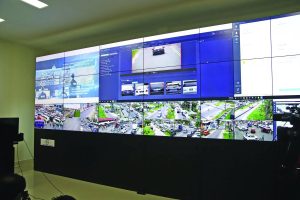Home Top Stories Govt announces countrywide CCTV surveillance to tackle crime
In light of the success that the Safe City initiative has garnered in reducing crime in Region Four (Demerara-Mahaica), particularly the Georgetown Division, President Dr Irfaan Ali has revealed that this programme will be expanded to other regions across the country.
He made this announcement during an Address to the Nation on Friday afternoon.
According to the Head of the State, Government wants to replicate the good crime-fighting results that have been recorded in the areas that are covered under the “Safe City” programme in other regions so as to bring down the country’s overall crime rates. 
“…to address all the regions nationally, we are going to have a ‘safe-country’ programme. We’re going to have the entire country connected onto CCTV cameras so that all of the country will be under watch by the relevant authorities so that we can be proactive in crime-fighting,” he declared.
The “Safe City” Project, which saw the installation of scores of cameras around Georgetown and the country’s main ports of entry, was launched in 2019.
A multimillion-dollar Command Centre at Liliendaal, Greater Georgetown, was activated with the intent of monitoring criminals, suspects, and vehicles involved in crimes. Works on the project had begun before the official launching through the country’s National Broadband Strategy, with funding from the China Exim (Export-Import) Bank and implementation through the services of Huawei.
Back then, it was assured that the initiative would not violate human rights as the operations would be guided by the Standard Operating Procedures (SOPs) developed by a team of United Kingdom security experts.
Meanwhile, President Ali on Friday also revealed that in addition to the surveillance expansion, Government will also be looking at investments in intelligence gathering. He noted that more crimes have been intercepted before commission as a result of proactive work and intelligence gathering.
However, the Head of State explained that in order for this to work it has to be community-centred, community-oriented and community-supported.
“We have to develop a trust between the [Guyana] Police Force and the community themselves… bridging that gap and integrating community in crime-fighting,” he posited.
Crime stats
During his Address to the Nation, President Ali gave an update on the Police Force’s statistics thus far this year, revealing that there is a 19.4 per cent decrease in serious crimes compared to the same period in 2020.
However, while there is an overall decrease in crime countrywide, the Head of State noted that there are some hotspots that need extra attention given their high crime rates. Region One (Barima-Waini) is one such area, having recorded a 132.4 per cent increase in crime when compared to last year.
The President noted that the strategy is to look at each area individually to find out what is the reason for the crime rates there.
“We know that there is an increased migrant population; there is displacement and of course, this is causing social economic issues and a resultant factor is crime. So, we are now targeting some specific policies and programmes to deal with Region One,” he stated.
On the other hand, Region Four A (Georgetown), a previously crime-prone division, has documented the largest decline in crime with 43.4 per cent. Similarly, Region Five (Mahaica-Berbice) has also seen a drop in crime rate by 52.1 per cent.
With regards to robbery under arms, while an overall 32.4 per cent countrywide reduction was recorded, Regions One, Six (East Berbice-Corentyne), Seven (Cuyuni-Mazaruni) and Nine (Upper Takutu-Upper Essequibo) have seen increases.
The Head of State went on to detail a breakdown analysis of these armed robberies, highlighting that 6.2 per cent of these occurred at home, 37.7 per cent in the streets and some 33.6 per cent at businesses. As such, he underscored the need to put more efforts on street policing.
The data compiled by the Police Force also outlines that armed robberies are mostly committed using pistols and usually occur between 12:00h and 18:00h daily, with Saturday having the highest number of RUAs, that is, 92 cases recorded on that specific day for the year to date.
“On Saturday, is what we would consider a high-risk day so now we have to build our strategy to address this. By days, the nature of crime, the way in which they operate – these are the statistics that we have been working on so that policing and crime-fighting can be targeted and that is what we have been doing, fighting crime in a targeted manner,” the President stated.
Further, as Government put more effort into a structured and targeted approach to crime-fighting, the Commander-in-Chief disclosed that one of the measures Government will be looking at rolling out is an incentive-based crime-fighting system.
“So, one of the things that we are considering is incentivising the Police Force, where there is good performance there must be differentiated treatment. You must be recognised for good performance,” the Head of State stressed. (G8)
